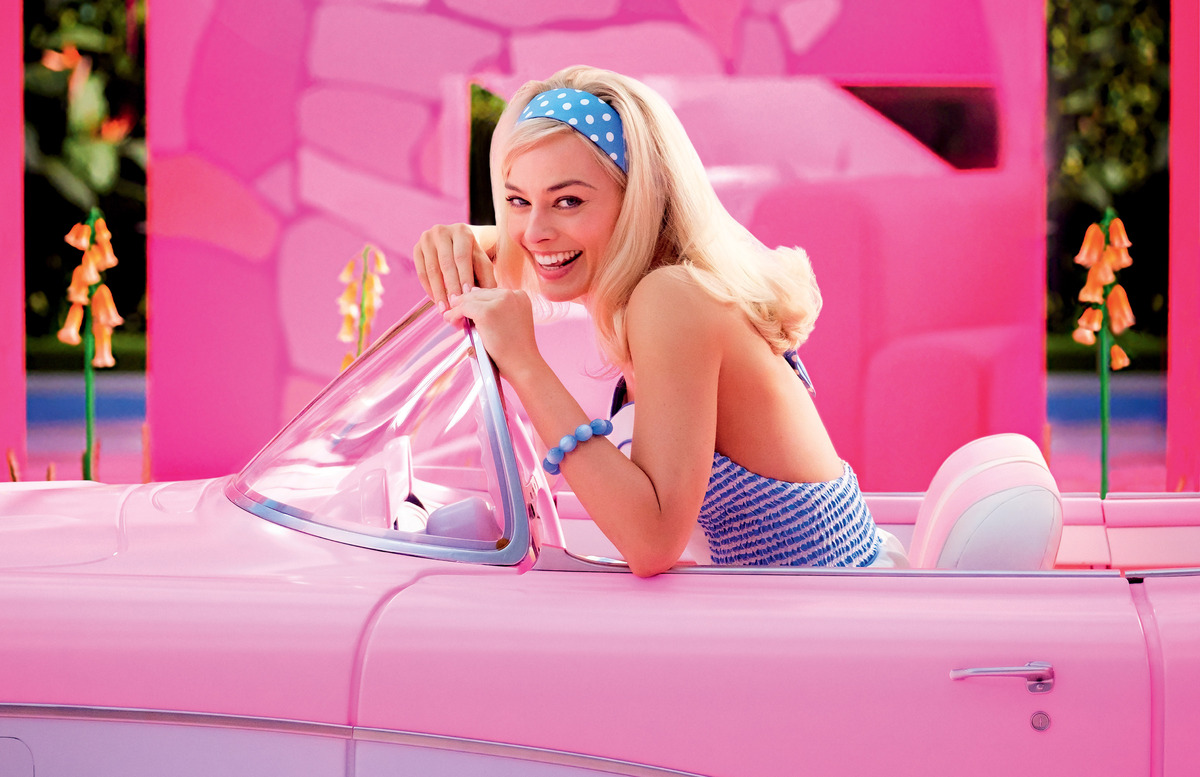
Based on one of America’s most emblematic pieces of intellectual property, Greta Gerwig’s Barbie starring Margot Robbie, above, was never going to be just a movie, because Barbie was never just a doll.
Warner Bros. Pictures
hide caption
toggle caption
Warner Bros. Pictures

Based on one of America’s most emblematic pieces of intellectual property, Greta Gerwig’s Barbie starring Margot Robbie, above, was never going to be just a movie, because Barbie was never just a doll.
Warner Bros. Pictures
At some point long before the film was unveiled to us critics, Greta Gerwig’s Barbie became more than just a movie based on one of America’s most emblematic pieces of intellectual property. Maybe it kicked off in the wake of oh-so-many memes, or in being pit against another highly-anticipated movie deemed its aesthetic and ideological opposite in a silly box office showdown. Then again, nearly every retailer catering to femmes has jumped on this bandwagon, too, either directly or indirectly. (My inbox and Insta feed are currently flooded with weeks’ worth of shameless promos for blazing hot pink and fluorescent items I’ll never wear; even my local barre studio is getting in on the action with a forthcoming Barbie-themed class.)
In any case, Barbie is officially and unequivocally The Moment™, The Vibe™, The Toy™ so many of us suddenly wish to play with again, even if it’s been decades since the last time. It was never going to be just a movie, because Barbie the doll was never “just a doll”; its creator Ruth Handler had grand ambitions for this free-spirited plastic woman, ones which, famously, haven’t always aligned with the public’s perceptions. Gerwig’s offbeat technicolor fantasy (co-written with her partner, Noah Baumbach) builds upon this historic push-and-pull to imagine a more harmonious ideological relationship between the brand and the consumer of today.

That doesn’t make the movie’s existence as a corporate propaganda piece any less fraught – Mattel Films is a producer – but to its credit, Barbie is eager to at least try confronting its own conundrums. And let’s be real: sometimes, corporate propaganda can be fun as hell.
Cleverly riffing on the “dawn of man” sequence in 2001: A Space Odyssey, the opening scene positions its product as the ultimate game changer in the doll universe, expanding the playtime horizon for young girls beyond the maternal default. The film’s cheeky unseen narrator voiced by Helen Mirren channels the ghost of Handler (and, perhaps, Chaka Khan) by noting Barbie can be anyone and everyone: a doctor (Hari Nef), an author (Alexandra Shipp), a president (Issa Rae), brunette, Black, and so on.

After months of marketing, memes, and a sense of momentousness, we unboxed the Barbie movie: It is both a delight and at times, too much.
Warner Bros. Pictures
hide caption
toggle caption
Warner Bros. Pictures

After months of marketing, memes, and a sense of momentousness, we unboxed the Barbie movie: It is both a delight and at times, too much.
Warner Bros. Pictures
Her symbolic malleability and ambition have led to a sort-of utopia called Barbie Land, where every version of Barbie lives blissfully in their own perfect Dreamhouse. There are many versions of Ken, too, though he’s merely “superfluous,” an accessory of lesser importance than Barbie’s many flashy outfits or prized convertible. Patriarchy? Where? (We’ll find out soon enough.)
The main Barbie is Stereotypical Barbie, played with verve and bite by Margot Robbie; she spends days at the beach and evenings throwing slumber parties, while awkwardly side-stepping the persistent advances of Ryan Gosling’s Ken – “just Ken” – much to his chagrin. One night, in the middle of a fabulous, elaborately choreographed ensemble dance number, she’s suddenly overcome by “irrepressible thoughts of death” she can’t shake off, try as she might. Those thoughts give way to other wonky occurrences that upset Barbie’s perfect world, which in turn set her and Ken on a journey to the very imperfect real world. There she searches for answers from her human owners, a jaded tween named Sasha (Ariana Greenblatt), and her mother Gloria (America Ferrera), a Mattel employee.

This rundown only begins to touch on the myriad of ideas and metacommentary funneling throughout Gerwig and Baumbach’s Barbie vision, which is both a delight and, at times, a bit much. The jokes are plentiful, and the cast, which also includes Kate McKinnon as – who else? – Weird Barbie and Will Ferrell as Mattel’s unnamed CEO, looks as if they’re having a blast. This is most true of Gosling, whose handsome himbo, deeply insecure about Barbie’s indifference toward him, is the movie’s secret weapon and an unsubtle, pitch-perfect rumination on American masculinity. Gosling makes Ken more than “just Ken” – he’s an instantly recognizable dude, exaggerated enough to fit in at Barbie Land, and relatable enough to evolve as a character apart from his far more famous and beloved counterpart.

Ryan Gosling makes Ken more than “just Ken.”
Warner Bros. Pictures
hide caption
toggle caption
Warner Bros. Pictures

Ryan Gosling makes Ken more than “just Ken.”
Warner Bros. Pictures
American masculinity will never not be ripe for ribbing, but conflict inevitably arises in considering Barbie‘s blunt self-critiques, sealed as they are with Mattel’s approval. Stereotypical Barbie is rendered exactly as her name suggests: blond, thin, [presumably] straight, and Margot Robbie … i.e., the first image that likely comes to mind when anyone thinks of Barbie, as she herself proudly admits early on. Pointing this out is subversive, to a point – for all the brand’s exaltations about representing everyone – in recent years, to combat plummeting sales, Mattel has expanded the doll’s shapes, shades, and facial features – the movie is also admitting that the symbol that still looms large is white and supermodel-esque. And there’s a case to be made that Stereotypical Barbie is a sly swipe at superficial white progressivism, and in particular, the #Girlboss era – I wouldn’t put it past Gerwig, who’s proven an astute thinker and filmmaker in her previous works.

Yet Barbie‘s limitations as a vehicle for substantial commentary are two-fold. For one, the execution is sometimes wonky, like a long, stilted monologue about how “impossible” it is to be a woman because, The Patriarchy. (Nevertheless, this speech elicited claps of approval from my audience, which I saw coming as soon as the character started going in on unrealistic beauty expectations.)
The other rub is inherent – critique can only mean so much when the entity under the microscope also happens to be the one writing (and cashing) the checks. Even the sillier and less overtly self-referential punches come off favorably for Mattel, breathlessly burnishing the brand’s legend in nearly the same fashion as Marvel’s ongoing exaltations of Stan Lee.

Issa Rae, Scott Evans, Simu Liu, Emma Mackey and Ncuti Gatwa as Barbies and Kens.
Warner Bros. Pictures
hide caption
toggle caption
Warner Bros. Pictures
That being said, Barbie isn’t just a movie that could never fully escape out from under the weight of its artistic comprises. It’s a hoot, a feast for the eyes and ears. Sarah Greenwood’s production design is sensorially astounding; Barbie Land is conceived as it’s appeared in kids’ imaginations for decades – both tangible (plastic shower, toaster, or car) and intangible (invisible water, toast, or motor). The makeup team confidently balances an essence of plasticity without drowning in it to the point of the uncanny. There are musical numbers and A+ cameos. (I’d love to get Lizzo to sing-narrate my life, too, please!)

And did I already mention Ryan Gosling? RYAN. GOSLING. YES.
It’s a movie that sits at an interesting inflection point in moviemaking and movie consumption, when almost every idea seems born from a pre-existing product. While it’s easy to balk at – and believe me, I have; many, many times – the truth is, the tension between filmmaking and commerce has and always will be present in the work itself, be it a broad Hollywood blockbuster or the most idiosyncratic and Terrence Malick-y of endeavors. Something like Barbie lays that tension bare and exposed in its unabashed commercialism and heightened sensiblities, so that you can’t not think about how its aims may be at odds with its execution.
But that’s also part of what makes it such an interesting oddity to witness. It’s a Barbie world you’ll be more than happy to have visited, even as it confounds.
For all the latest Entertainment News Click Here
For the latest news and updates, follow us on Google News.
